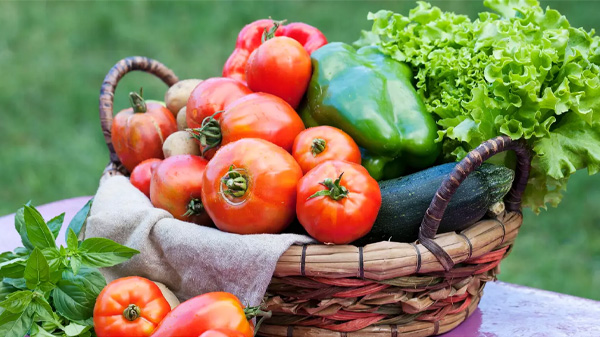Beat Dehydration with These Summer Vegetables

- Update Time : Saturday, 20 April, 2024, 03:46 pm
- 77 Time View

Online Desk: As the temperatures soar during the scorching summer months, it becomes increasingly crucial to prioritise hydration. Dehydration occurs when the body loses more fluids than it takes in. Dehydration may lead your body to adverse effects ranging from fatigue and headaches to more severe complications like heatstroke. While it is common knowledge to increase water intake during hot weather, many overlook the hydrating potential of the summer vegetables.
Why Incorporate Summer Veggies into Your Diet
Maintaining adequate hydration levels is crucial for maintaining overall health and well-being. Water is essential for regulating body temperature, aiding digestion, transporting nutrients, and flushing out toxins. Dehydration can lead to a range of adverse effects, including fatigue, headaches, dizziness, and even more severe complications like heatstroke.
By staying adequately hydrated, you can enhance cognitive function, improve physical performance, and support organ function. Make it a priority to drink water regularly throughout the day to ensure optimal hydration and vitality, especially in the summer heat.
Summer veggies are rich in diverse vitamins and nutrients. Adding vegetables to regular meals can help you stay hydrated and healthy during the warmer months. Let’s take a look into some nutritious summer veggies to fight dehydration this summer.
Nutritious Summer Vegetables to Beat Dehydration
Cucumber
Cucumbers are hydrating vegetables packed with nutrients like vitamins A, B, and C, along with minerals such as potassium and magnesium. With a water content over 95%, they replenish lost fluids and electrolytes, aiding hydration.
Enjoy cucumbers sliced in salads, sandwiches, or refreshing cucumber mint smoothies for a hydrating boost. Incorporating cucumbers into your diet regularly can promote skin health, aid digestion, and support overall well-being. Aim for at least one or two cups of cucumber daily to reap its hydrating benefits.
Tomatoes
Tomatoes are hydrating vegetables boasting a water content of around 94%. Rich in vitamins A and C, along with antioxidants like lycopene, they support immune function and promote heart health. You may incorporate tomatoes into your diet to enjoy their hydrating benefits.
Try them tossed in salads or sandwiches, blended into soups, or roasted with herbs for a flavourful side dish. It is recommended to include 1 or 2 tomatoes in your meals regularly to hydrate your body and boost your health.
Bell Peppers
Bell peppers, with a water content of approximately 92%, are hydrating vegetables rich in vitamins A, C, and K, as well as antioxidants. They support immune function, promote healthy vision, and reduce inflammation. You can incorporate bell peppers into your meals to enjoy their hydrating benefits.
Add them to stir-fries, salads, or stuffed pepper recipes for a colourful and nutritious dish. Experts suggest limiting having one bell pepper in a day in your diet to stay hydrated and nourished, especially during hot weather without causing bloating or gas.
Lettuce
Lettuce varieties like iceberg and romaine are primarily composed of water. It is a hydrating vegetable that provides essential nutrients like vitamins A, K, and C, as well as folate and iron. It supports healthy skin, boosts immunity, and aids digestion.
Try to include lettuce in your diet for hydration and nutrition. Use it as a base for salads, wraps, or sandwiches for a refreshing and low-calorie meal option. Enjoy lettuce regularly to stay hydrated and promote overall well-being, aiming for around or less than two cups of green leaf lettuce per day.
Spinach
Spinach, packed with water, is a hydrating vegetable loaded with vitamins A, C, and K, along with iron, potassium and folate. It supports bone health, boosts immunity, and aids in blood clotting.
Add one handful of spinach daily into your diet for hydration and nutrition. Add it to salads, smoothies, or cooked dishes for a nutritious boost. These can help you to stay hydrated and reap its numerous health benefits.
Zucchini
Zucchini is a versatile summer squash with a water content of approximately 95%. This is a hydrating vegetable rich in vitamins B6, C, and K, as well as potassium and manganese. It supports heart health, aids digestion, and promotes healthy skin.
One can add zucchini into their diet for hydration and nutrition. Use it in stir-fries, salads, or in a curry. You can also try zucchini noodles or stuffed zucchini recipes for a delicious and hydrating snack option. It is safe to have two zucchinis regularly to stay hydrated and nourished.
Cabbage
Cabbage varieties like green and red cabbage are composed of over 90% water. It is a hydrating vegetable rich in vitamins C and K, as well as fibre and antioxidants. It supports digestive health, reduces inflammation, and promotes heart health.
Try to add cabbage into your diet for hydration and nutrition. Enjoy it in coleslaw, or stir-fries. Cabbage rolls or stuffed cabbage recipes are also popular options for a delicious and hydrating meal. You may have half a cup of cabbage regularly in your meals for its numerous health benefits.
Green Beans
Green beans are hydrating vegetables with a water content of approximately 90%. They are rich in vitamins A, C, and K, as well as fibre and antioxidants. They support bone health, aid digestion, and regulate blood sugar levels.
You can enjoy half a cup of green beans in your diet for hydration and nutrition. Enjoy them steamed, stir-fried, or sautéed as a side dish or in salads. Green bean casserole or green bean salad recipes are popular choices as snacks.
Cauliflower
Cauliflower is a cruciferous vegetable with a water content of around 92%. This is a hydrating vegetable rich in vitamins C and K, as well as fibre, choline, and antioxidants. It supports detoxification, brain health, and immune function.
You should eat half a cup of cooked cauliflower into your diet for hydration and nutrition. Use it as a low-carb alternative to rice or mashed potatoes, roast it with herbs and spices, blend it into creamy cauliflower soup, or add in a mixed vegetable curry. Enjoy cauliflower regularly to stay hydrated and reap its numerous health benefits.
Ash Gourd
Ash gourd is also known as winter melon and is a hydrating vegetable with a water content of approximately 96%. Rich in vitamins C and B, as well as minerals like calcium and phosphorus, it supports immune function and bone health.
Ash gourd is low in calories and high in fibre, making it beneficial for weight management and digestion. Enjoy ash gourd in soups, curries, or as a refreshing juice. It is better to limit ash gourd juice to 1 small cup in a day for hydration and nutrition.
Bottom Lines
Beat dehydration this summer by incorporating hydrating summer vegetables into your diet. With their high water content and abundance of essential nutrients, vegetables like cucumbers, tomatoes, bell peppers, and more can keep you refreshed and revitalised. Whether enjoyed in salads, soups, or smoothies, they are nature’s hydration heroes with a plethora of nutrients to support overall health and well-being even in the hottest weather.
















